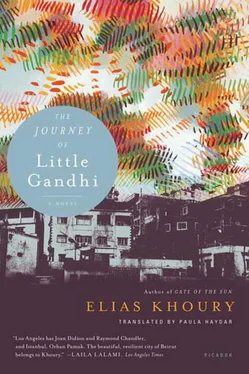When he told the story to Abu Saeed, he added the part about Vitsky’s infatuation with him, and how his priest’s habit prevented him from committing a sin. The priest was making things up of course, for Vitsky never met him at the diocese. The last time she visited the diocese, when the scandal with Bishop Athanasios took place, she was twenty years old. Father John was still a child playing soccer in Malab al-Salaam. He said she fell in love with him, and until this day he still has a special place in his heart for her. That’s why he insisted the bishop attend the funeral, even though Abu Saeed had seen him screaming at Lillian, telling her it would be impossible.
Father John was convinced of what he told. We’re all like that. We believe in what we say. And when I try to write what they told me, I discover that Alice was right.
“Memories are a disgrace, my son. Once you get to the point where there’s nothing left but your memories, it’s over. The mule has stopped pulling for you, and the lantern’s on its last drop of oil.”
Vitsky was scared when Simaan Fayyad drove her to Lillian Sabbagha’s house. Lillian was living with her daughter Sorayya and her husband, George. Vitsky agreed with Lillian to come every day to help with the housework, but she refused to sleep at the house. Mr. George helped her find a room to rent at the end of Makhoul Street, the very room in which the white princess died.
Vitsky was not a maid in every sense of the word. Actually, there was an elderly maid called Wadia at Madame Sabbagha’s house. Vitsky was the caretaker. She spoke only French. She decided which foods were to be cooked and would not tolerate anyone questioning her orders. She despised that Lebanese bourgeoisie, which could fathom only the outer skin of civilization.
After Mr. George died of leukemia, and the daughter was sent to a school for the handicapped in the village of Beit Miri, a strong friendship grew between the maid and the mistress. The mistress thrived on the past glories of the Sabbagha family, and the maid refused to tell anything about Russia and the czars. The maid was the true mistress. She acted as though the house belonged to her, and as though Madame Lillian was living in her house. The main thing that bothered Vitsky was her feeling that she’d come to Beirut against her will. She’d fled to Istanbul with her cousin Philip, who was an officer in the White Army. Vitsky always insisted on calling it Constantinople after the occupation of the family castle in Kiev. She fled with her cousin Without knowing anything about the true fate of the rest of her family. One of the emigrant White Russians who surrounded Istanbul told her they were all killed. From Istanbul they’d decided to immigrate to Alexandria. Her cousin made the decision, and she went along with it. Vitsky believed they’d get married in Alexandria. Her cousin disappeared. He left her in the small hotel on a street whose name she didn’t know. He left and didn’t come back. She waited ten days for him and then boarded the ship that took her to Beirut rather than Alexandria.
In Beirut she found nowhere to go but the diocese. There she found herself among a group of immigrants who’d been given makeshift accommodations. Vitsky lived there in a small room with no windows near Akawi hill and began giving private French lessons in people’s homes.
She told Madame Lillian she preferred teaching.
Madame Sabbagha smiled wickedly. She didn’t tell her her daughter was disturbed, but that she was at a boarding school and Vitsky could tutor her during the summer.
And Vitsky became a maid, thanks to Simaan Fayyad, who saved her from that strange situation she found herself in when Bishop Athanasios tried to sleep with her.
In this white young woman, the bishop saw the features of kings.
“You look like the czars,” he said to her.
And she always denied having any relation to the Romanov family. She said she was of noble blood and that her fiance was an officer in the Royal Army.
“You’re being modest,” the bishop said, refusing to believe her.
The bishop fell in love with this young woman. He’d take her with him to visit the richest families in Beirut, where he’d arrange for her to work as a tutor for their daughters.
Every evening the bishop would invite her to evening prayers. He always prayed at 4:30 in the evening, in the small church in the diocese. At 4:15 she’d find Simaan Fayyad waiting for her at the door to her room. He’d walk her to the parish, and there she’d join in the prayer in a language she didn’t understand. Once she said the prayer of Zakariyya. She said it in French, her voice trembling. “Now release your slave, O Master, according to your word, in peace.” And when she reached the word peace, when Zakariyya asks God to kill him, she stopped chanting and her voice was drowned with sobs. The tears rolled down her face, and the deacons who were attending the prayers were struck with amazement and sorrow.
That day “His Eminence” made her stay for dinner, and after dinner he took her to the reading room, and there he tried to sleep with her. Vitsky didn’t say anything, not knowing Arab customs. It never occurred to her that this old man in his seventies would try what her young officer fiancé never tried.
He pulled her toward him and kissed her on the forehead. The smell of old wood, like the smell of icons, permeated the reading room. And His Eminence Athanasios with his white beard, short stature, and neck that shook from side to side, diffused an aroma like the smell of wood. When he kissed her forehead she was taken by the smell, as though she’d surrendered to him. So he pushed her against the wall. She stood, not understanding what was happening, and he went after her. Just like that, with no introductions, he started kissing her face. She began to scream and so he put his hand over her mouth. She threw her arms up to push him away, and then she ran. She couldn’t find the door; the dim light made it difficult for her to see. She ran and fell onto the floor. There he was, on top of her in his black priest’s gown, trying to pin her down. The sound of him panting rang in her ears. She slid out from under him using her elbows and stood up. She found the door in front of her, opened it, and ran out.
In the courtyard she noticed the blood.
The edge of her olive-colored dress was covered with blood. She bent down, overcome with grief, and found a deep cut on her right knee. Simaan Fayyad offered her his arm without saying a word. She held on to the man’s arm and went back to her room.
Whenever Vitsky got sad and when the anxiety of waiting for her fiance who never came back took hold of her, and memories brought her to the brink of regret, she’d uncover her knee to show Lillian Sabbagha the scar that would never disappear. She’d tell her there was only one place she wanted to be buried, in Kiev, in Holy Russia.
Madame Sabbagha would try to soothe her by telling her she reserved a plot for her among the Sabbagha family graves and that she’d be buried next to the noblest family in Beirut.
“We are the seven families, my dear, and you will be buried with one of the great families. As if you were at home.”
Madame Sabbagha would start telling the story while knitting with some blue yarn and blue knitting needles, sitting in the middle of the living room. Vitsky sat with her, listening with half an ear. Madame Sabbagha wouldn’t turn on the lights until it got completely dark inside. But during the early hours of the evening, when light mixes with darkness, Vitsky could no longer see anything but the open loops in the yarn, for Madame Sabbagha refused to turn on the lights.
“I’m not stingy, but why do we need the lights when we can still see? It’s a waste.”
Читать дальше












